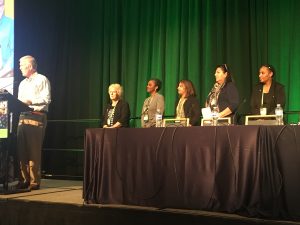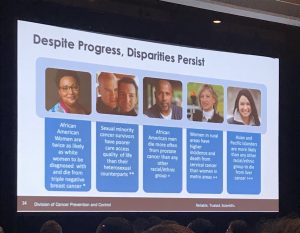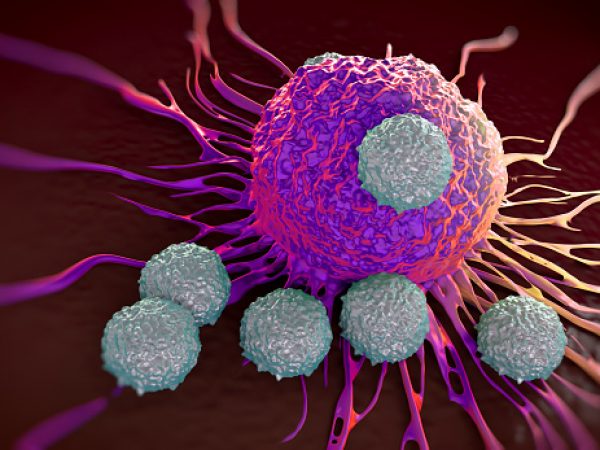“It Doesn’t Have to be This Way”: Targeting Cancer Health Disparities
The 12th AACR Conference on the Science of Cancer Health Disparities in Racial/Ethnic Minorities and the Medically Underserved kicked off Friday evening in San Francisco with a passionate call to fight cancer disparities on every front, from socioeconomic to biological.
“Everyone in this room is united in our goal to eliminate cancer health disparities,” said Phyllis Pettit Nassi, MSW, associate director of Research & Science, Special Populations at Huntsman Cancer Institute in Salt Lake City, one of several cochairs of the conference. “Medical research powers our ability to treat our patients. Conferences such as this, where we unite as a community, fuel hope that we can improve the lives of our patients.”

Highlighting patients’ central role in the disparities conference, Pettit Nassi introduced several members of the AACR Scientist↔Survivor Program. Through SSP, patient advocates learn about cancer research and interact with scientists, doctors, health professionals, and other advocates. At the disparities conference, several will present posters on research they’ve undertaken as part of the SSP program.
“These advocates are the reason why we do what we do,” Pettit Nassi said.
This year’s disparities conference is the largest ever, with more than 800 attendees. “This speaks to a growing awareness and interest in the field,” said Clayton C. Yates, PhD, professor in the Department of Biology and the Center for Cancer Research at Tuskegee University in Tuskegee, Alabama, who was also a cochair.
Friday’s speakers emphasized the fact that many factors contribute to cancer health disparities, and the field continuously grows to reflect greater understanding of underserved populations. Whereas disparities research once centered mostly on race, the field now encompasses LGBTQ research, immigration issues, and the rural/urban divide. The conference will feature timely research on all these underserved populations.
Lisa C. Richardson, MD, MPH, director of the Division of Cancer Prevention and Control at the Centers for Disease Control and Prevention (CDC) in Atlanta, surveyed the broad scope of disparities research in her keynote address, titled “It Doesn’t Have to Be This Way.”

A native of rural North Carolina, she shared with the audience that in a 60-minute drive from her hometown to the next major city, life expectancy increases by seven years. “Is this right?” she asked. “No, it’s not.”
She discussed numerous CDC programs that have sought to narrow disparities by providing comprehensive research that tracks cancer incidence and mortality in all corners of the United States. For example, the CDC’s 500 Cities Project compiles data for chronic disease, including cancer, in America’s largest cities. Richardson said that data often provides the basis for local, targeted interventions aimed at preventing cancer and other diseases.
Also at the opening ceremony, Steven R. Patierno, PhD, deputy director of the Duke University Medical Center, Durham, North Carolina, was honored as the recipient of the AACR Distinguished Lectureship on the Science of Cancer Health Disparities.
In his talk, titled “In Pursuit of Cancer Health Equity: Cancer Disparities Research and Intervention Across the Disparities Continuum,” Patierno explained that his interest in disparities grew out of volunteer work he and his wife did while he was director of the George Washington Cancer Center in Washington, D.C. Working in the poorest neighborhoods of the nation’s capital, he realized many residents simply could not access the high-quality health care available at places like George Washington.
“I carried that burden into my cancer center directorship,” he said, and gradually shifted the focus of his research from molecular carcinogenesis to the biological basis of cancer health disparities. His current research focuses on differences in RNA splicing, a biological process, between white and African American patients with prostate cancer and non-small cell lung cancer.
James Lillard, PhD, MBA, associate dean for research and professor at the Morehouse School of Medicine in Atlanta, provided a brief update on the AACR 2020 by 2020 Initiative. The program, which aims to sequence tumor and normal tissue from 2,020 consented African American cancer patients, is progressing well, with participating institutions accruing patients at a steady pace, he said.
Laura Fejerman, PhD, conference chair and associate professor in the department of medicine at University of California, San Francisco (UCSF), said the numerous initiatives highlighted during the opening ceremony exemplify the diversity of the conference.
“These are great examples of the work that so many are doing to diversify research and put an end to cancer health disparities,” she said.
We’ll be sharing more from the disparities conference in the days to come.



